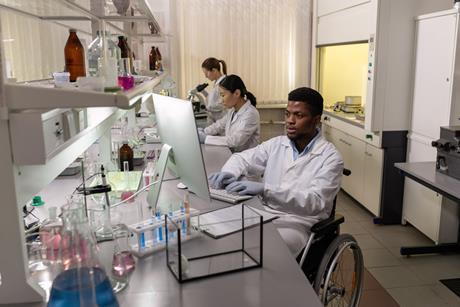L3 Laboratory technician standard
How to prepare for your end-point assessment
The EPA for the L3 Laboratory technician standard (start date after May 2020) comprises three parts:
- Knowledge test
- Observation with questioning
- Structured interview underpinned by a portfolio of evidence
This guide is designed to complement the information contained in the EPA plan for your apprenticeship standard and is not intended to replace conversations with your training provider, manager and EPAO. You can find your EPA plan by going to the Institute for Apprenticeships and Technical Education (IfATE) website.
Not sure if this guide is right for you?
Check out our introduction to end-point assessments to get started.
Getting prepared for a knowledge test
The knowledge test is how you will demonstrate that you can correctly recall factual information relevant to your apprenticeship. You will complete the test either on paper or at a computer, and it will comprise 40 multiple choice questions. You will have up to 75 minutes to complete the test, and it will be graded as ‘pass’ or ’fail’.
The questions will only have one correct answer and five of the questions will be ‘scenario based’. What this means is that there will be a case study, or description of a situation given, that you should read carefully before starting to look at the questions about it. Taking your time to read the information given will help stop you from making avoidable mistakes.
This test will be closed book, which means that you will not be able to take reference materials into the test with you or look things up online. Success in this test will depend on you taking the time to learn and revise specific information that you have learned during your apprenticeship. Check the assessment plan for your standard – it will tell you what knowledge you are being assessed on in this part of the EPA, which will help guide you in what to revise.
The questions will focus on certain knowledge, skills and behaviours that are outlined in your apprenticeship standard and may test your understanding of how you apply those things in your specific role at your place of work, in order to do your job safely, efficiently or deliver good service to customers or colleagues.
Find out from your training provider who your EPAO is and ask if there are mock test papers available. Looking at mock test papers will help you to understand the types of questions you should expect, the depth of detail you will need to know to be able to answer them correctly, and the breadth of different things you could be asked about.
Top tip: ‘Practise past questions (you should be able to get these from your training provider or EPAO) and read the marking criteria so you are more aware of the set up and what is required.’
Sabiha Jahen, Laboratory Technician. Completed the level 3 laboratory technician EPA.
You should also see if your EPAO has created a glossary of terms that you can use to help you to revise for this test. A glossary is a list of words or terms, with a brief explanation against each one of what they mean. Making sure you can recall the meaning of each item in the glossary and how it is relevant to your role will help you to go into your knowledge test confidently.
Top tip: ‘There will only ever be four answers to choose from and only one correct answer for each question. Take your time as you work through the questions and make sure you go back and re-read what you have done if you have time at the end of the test. 28/40 is all you need to pass, there is no distinction grade for this element.’
Simon Jukes, Director, EPAO for scientific apprenticeship standards
Getting prepared for an observation with questioning
For this part of your EPA, you will be given a laboratory-based experiment, tes or task that you will need to prepare for and carry out at work, while being observed by an assessor from the EPAO.
This is an assessment of your practical skills, the behaviours you demonstrate to make sure that you are working safely and accurately and the underpinning knowledge of why you are doing certain things in the process. It is graded ‘pass’ or ‘fail’.
Check the assessment plan for your standard – it will tell you what knowledge, skills and behaviours you are being assessed on in this part of the EPA, and it will also tell you what the assessors will be looking for to grade you as pass or fail.
The assessor will not get involved in any way while you are carrying out the experiment and will only ask questions at the end. They will probably take notes throughout.
The whole thing will take up to three hours, with 20 minutes allowed for the assessor to ask you a minimum of five questions. You will be able to take breaks during the three-hour session (eg to use the loo or move to a different part of the lab), and, if necessary, the session can be split up to take place across one working day (up to 7.5 hours). This might happen if, for example, you need time for a reaction to take place or for a matrix you have prepared to set.
The scientific processes that you are given to complete will have been agreed in advance between the EPAO and your employer and / or training provider, so you should know what you will be doing ahead of the day, and it will reflect the sort of thing that you do on a regular basis at work; it will not be something that you have only recently learned how to do or are not fully familiar with so you should go into it confident that you know what you are doing!
Top tip: ‘If your observation is going to involve you processing or analysing samples that you have produced, make sure to have them, and any props you might need, ready.
Let your colleagues know that you will be having an observation so that they won’t process or store away your samples. Have a practise run with a senior colleague; this can help you to ease nerves and they can help to fill in any missing knowledge, plus if you have any last-minute questions, they can help with them. Have a little post-it note with places / things you want to show the observer so you don’t miss out anything important.’
Sabiha Jahen, Laboratory Technician. Completed the level 3 laboratory technician EPA.
The assessor will be looking for evidence of the following sorts of things, that you can work safely; that you can follow established procedures, that you comply with regulations relevant to your work and that you follow quality systems. In advance of your observation, you could ask your workplace mentor to work through the agreed task with you, making sure that you demonstrate all of those skills and behaviours; you could get them to ask you questions about what you are doing and why. Your training provider might also be able to do some mock observations with you based on the assessment plan, to help you build your confidence before the EPA and practise answering the types of questions you might be asked.
You will be asked ‘open questions’. This means that the questions will not have ‘yes’ or ‘no’ answers – they will give you the chance to demonstrate how well you know your area of work, the techniques that you are performing, and why. You should try to give as much detail in your answers as possible, so that the assessor does not have to draw information out of you. If you are unsure of what the assessor means when they ask you a question, ask them to clarify – it is ok to check your understanding of the question before you start to answer. Try to approach this as a conversation, not an interrogation. Remember, the assessor is a person and they will want you to succeed.
Top tip: ‘Often the assessor will have some experience in a similar lab to the one you are working in but remember you are the person that carries out this work every day and you should know much more about your company procedures than the assessor. When observing you, the assessor is looking to see if you know HOW to do the job, but they also want evidence that you know WHY you are doing the job in that way. Be forthcoming with explanations of why you cleaned down the bench or added a control sample to a batch or recorded certain information about the work you carried out. This gives great context and helps the assessor to gather the evidence they need to pass you.’
Simon Jukes, Director, EPAO for scientific apprenticeship standards
Getting prepared for a structured interview underpinned by a portfolio of evidence
This part of your EPA could take place online, at work or at another suitable venue, such as a quiet room at your college, and it will take 75 minutes. An assessor from the EPAO will ‘interview’ you by asking you a minimum of 20 questions to assess you against any of the knowledge, skills or behaviours in your apprenticeship standard that have not been covered by other parts of your EPA.
Check the assessment plan for your standard – it will tell you what knowledge, skills and behaviours you are being assessed on in this part of the EPA, and it will also tell you what the assessors will be looking for to grade you as pass, fail or distinction, so you will know what you need to do to achieve each grade.
In particular, the questions might focus on any specialised areas of knowledge that are specific to the type of work that you do. For example, if you work with human tissue, you might be asked about the ethical policies relating to that; if you work with radioactive materials, you might be asked about specific health and safety policies in place. When you are preparing for this part of your EPA, make sure you are aware of all of the company policies and SOPs relating to your area of work, and that you understand their importance.
In the run-up to your EPA, you will have prepared a portfolio of evidence. In this portfolio, you should have a few pieces of evidence against knowledge, skills and behaviours from your apprenticeship standard, which will help you to prepare for the interview. The assessor will see this portfolio and will use it to decide what questions to ask you. You will be able to refer to the portfolio during the assessment and use it to jog your memory or support the answers you give.
Top tip: ‘Create a folder with all of your competencies and have it in sections eg health and safety or quality. This will help you to find information / evidence quickly. Also have a page with all of your legislations so that you can refer to it if needed.
Take deep breaths and feel free to ask the observer to repeat questions, and if you need to come back to a question it’s ok. Good luck!’
Sabiha Jahen, Laboratory Technician. Completed the level 3 laboratory technician EPA.
When you are getting ready, you should familiarise yourself with what you have put into your portfolio and make sure it is easy to navigate. Your competency log from your apprenticeship will be a good source of evidence for your portfolio.
Check whether your training provider can get you mock materials and any forms from your EPAO that will help you to fully prepare.















